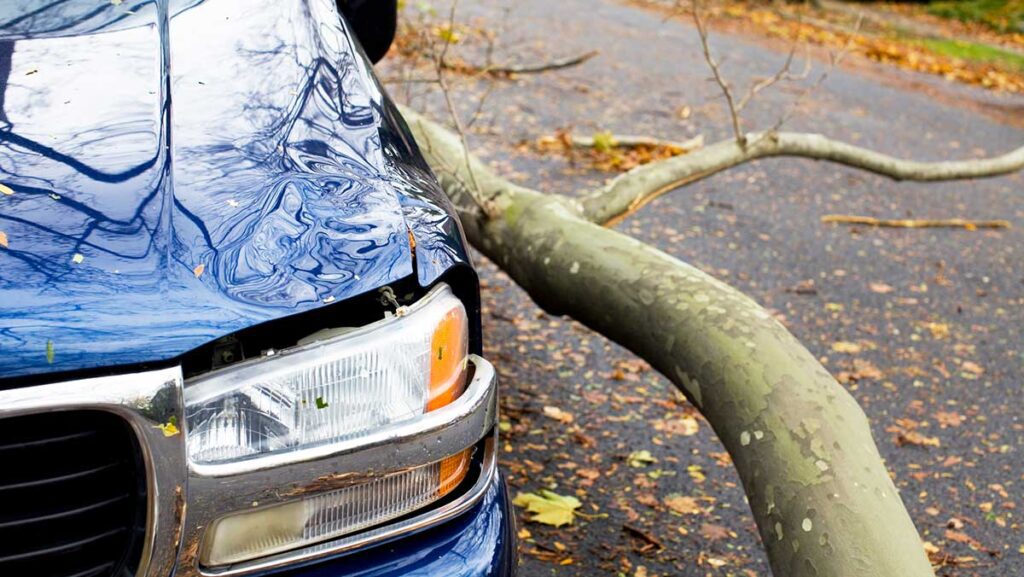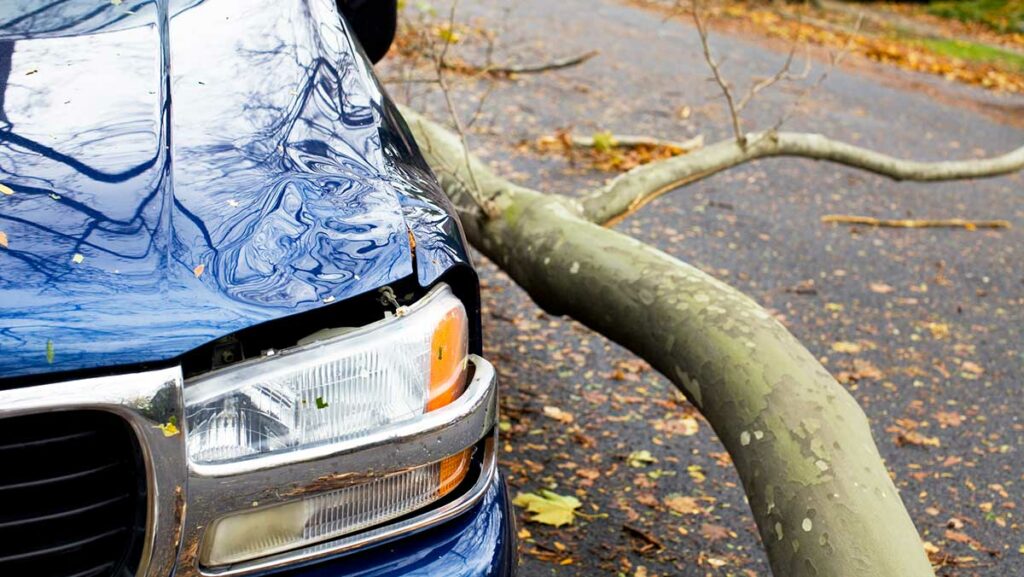What Is Comprehensive Car Insurance and What Does It Cover?

The overarching benefit of auto insurance is to provide financial protection against the unknown. Whether you drive a car, a truck, or a van, comprehensive car insurance can cover your vehicle in the event of an unforeseen emergency. Although adding comprehensive car insurance is recommended, it can drive the price of your insurance premiums higher.
What does comprehensive car insurance cover? More importantly, is comprehensive coverage the right decision for your auto insurance plan? Learn what comprehensive car insurance is so you can make the right decision for your budget.
What Is Comprehensive Car Insurance?
Comprehensive auto insurance is designed to help you pay for damages to your vehicle that aren’t caused by an accident, including theft, fire, storms, vandalism, or hitting an animal. It is an option available with all major auto insurance carriers.
The biggest advantage of comprehensive car insurance is that it covers unusual situations that you may not be able to afford out of pocket. For instance, if another car were to kick up a rock that hits your windshield, causing a chip or crack, comprehensive car insurance may cover your windshield replacement. Or, if you are driving down a rural road and a deer jumps in front of you and hits your car, comprehensive coverage could help you cover the resulting damages.
While the name suggests that comprehensive coverage will cover anything that could go wrong, it isn’t a “get out of trouble free” card. Like our previous example, if a deer were to hit your car, some comprehensive car insurance policies may only cover the damage to your vehicle. If you were to potentially run off the road and hit a fence, other benefits—like collision or property damage coverage—would likely be necessary to pay for the resulting damage.
How Does Comprehensive Car Insurance Work?
Before filing a claim, it’s important to understand which situations may qualify under comprehensive coverage. In most situations, your comprehensive car insurance could cover damages or losses as a result of:
Natural disasters (such as tornadoes, hailstorms, or hurricanes)
Theft from your vehicle
Vandalism to your vehicle
Falling objects that land on your vehicle
Damage caused by animals
When you start a comprehensive car insurance claim, it’s important to determine the root cause of the damages. For example, If you were to leave a purse or wallet in your vehicle and a robber were to break a window and steal it, you may be able to file a comprehensive claim for the replacement of both the wallet and any personal items stolen.
In addition, if your vehicle is parked in your garage and your water heater catches fire, your homeowner’s insurance may cover the damages to your structure, but comprehensive car insurance would cover the damage to your car, such as paint loss or interior damages.
When you file a claim on your comprehensive coverage, you will be required to pay your car insurance deductible, or the amount of damages you are responsible for. Deductibles can range from $0 to $1,000 or more, depending on which level of coverage you select. While a higher deductible can reduce your monthly car insurance premium, a lower deductible means you would pay less out of pocket in the event of an incident. As you shop online for car insurance, it’s important to determine the balance between how much you could afford per month compared to how much you could pay to have your car repaired.
Comprehensive Car Insurance vs. Collision Insurance: What is the Difference?
While they cover similar situations, comprehensive car insurance covers a very different set of circumstances than collision insurance. Both are designed to help you financially recover from unforeseen accidents, but in drastically different ways.
Unlike comprehensive car insurance, collision insurance is designed to cover your vehicle in the event of an accident. Collision insurance benefits may cover you if you end up hitting something while driving – including another driver, a tree, or another stationary object. Collision coverage could pay for repairs to your vehicle resulting from the crash, or potentially pay for a replacement if your vehicle is “totaled.”
However, collision coverage isn’t designed to protect you from damages caused by animals – even if you were to run into a deer or boar. If striking an animal while driving results in a smashed front end or a broken windshield, comprehensive car insurance would likely help you pay for repairs.
Comprehensive auto insurance could also help you recover from other things hitting your car. Let’s say a major storm comes through, and a large limb from a tree hits your vehicle, breaking the windshield and denting the hood. Even though the tree branch “collided” with your car, collision insurance won’t help you pay for the damages. In this situation, if you did not have comprehensive insurance, you could be left paying for repairs on your own.
Is Comprehensive Car Insurance Mandatory?
Although most states require drivers to maintain a minimum level of liability insurance, comprehensive coverage isn’t usually included. Because comprehensive car insurance only covers what could go wrong with your car, most state governments will not require you to add it to your insurance plan.
However, that doesn’t mean that you shouldn’t buy comprehensive car insurance, or that you won’t be obligated to hold insurance. If you are buying your vehicle with a car loan or are leasing a car, your financial institution company may not finalize funding until you add comprehensive coverage and collision coverage. If you fail to do so within 30 days, your loan could be canceled, or the lienholder could add extra insurance to your loan and force you to pay the difference.
In any event, comprehensive coverage is always a good option to add to your auto insurance policy. Under certain conditions, it can help you keep your car looking new and functioning well over time, potentially giving you a better return on your vehicle.
When Should I Get Comprehensive Car Insurance?
If you are on the fence about purchasing comprehensive car insurance, consider the current condition of your vehicle and any future repair plans. As you make decisions on what to add to your overall vehicle insurance coverage, consider the following situations:
Am I financing my vehicle? If you are planning to take out a loan to pay off your car, your lienholder will require you to carry comprehensive car insurance on your vehicle. There’s no way around it – if a financial institution holds your title, you will need to have comprehensive car insurance.
How new is my vehicle? Even though you may not be financing your vehicle, it’s still important to consider age as part of your decision to purchase comprehensive coverage. If you have a newer car and are planning on driving it for a long time, adding comprehensive auto insurance could help you keep your car in good physical condition, no matter what happens. On the other side, if your car is older, depreciated, or you are considering replacing it soon, you may be able to save money by dropping comprehensive coverage from your insurance plan.
What kind of vehicle do I own? Depending on what kind of vehicle you drive daily, you may need comprehensive coverage without even knowing it. Luxury cars and luxury SUVs often have the highest number of claims for theft, glass damage, and other incidents. If you own a vehicle that is targeted more frequently than others, you might benefit in the long run with the right comprehensive auto insurance plan.
Is my car parked inside a garage or outside? If you park your car in a garage every night, you have an additional layer of protection against the unexpected. Conversely, if you park your car outside every night, you have an additional risk of damage from animals, or even worse, break-ins from thieves. Even if you think it could never happen, comprehensive coverage could help you pay for broken windows and anything taken during a break-in.
Do I live in a place with seasonal weather concerns? Without warning, natural disasters like earthquakes, tornadoes, and hurricanes can tear through your region, leaving a path of destruction in their wake. Even if the disaster causes something to hit your car, collision insurance may not help you put the pieces back together. If you live in an area that has a reasonable risk of damages, like seasonal hurricanes, comprehensive coverage could prove to be a good value when it comes time to make repairs.
Get the Best Comprehensive Car Insurance from The General®
If comprehensive coverage is right for you, it’s important to get it from a partner you can trust. Start your auto insurance shopping by getting a quote from The General®. For over 50 years, we’ve covered thousands of Americans with quality insurance at a price they can afford. No matter what your needs are, The General® can help you find the right level of coverage and keep you moving forward.






